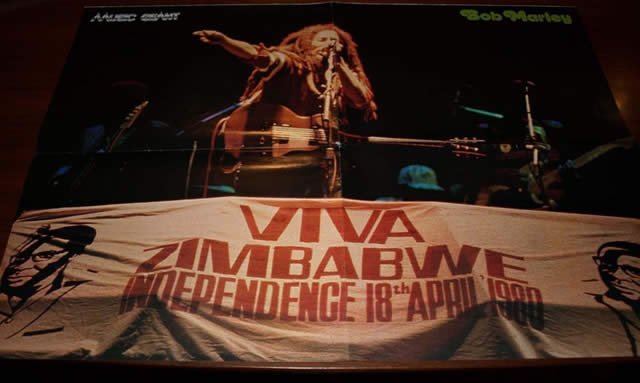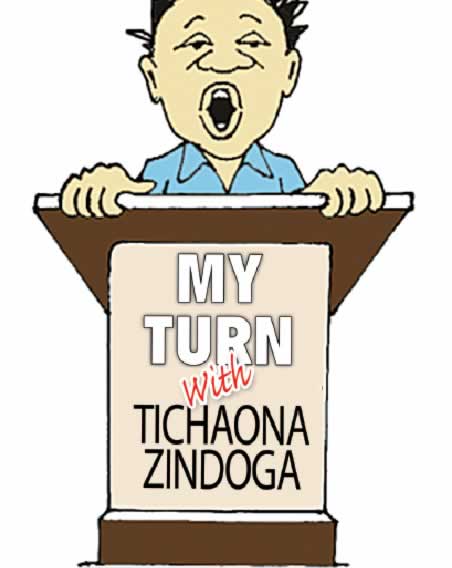Brother Bob Marley, you were right


The poster advertising Jamaican reggae star Bob Marley’s 1980 show, where Marley had a song entitled Zimbabwe which coincided with Independence Day festivities

SOMETIMES when old people talk about the liberation war, they speak with a certain romanticism that would make you feel that you lost quite a big deal. (That is, if you are part of the lucky genus called born-frees) Tales about pungwes, the songs and recollections make the war an adventure that was enjoyed by all those who were young and active in their different roles.
You could be one of the fighters — vakomana (the boys) vanamukoma (the brothers), the comrades, the guerillas or magandanga.
The latter term was of course used by the colonial establishment to paint the guerillas, known filially and familiarly by the former terms cited above, with a black brush.
A gandanga is a terrorist and one that must be feared and elicits obvious revulsion.
These magandanga were reviled by the settlers, and people were told that they were like animals of the wild; that they did not bath; that they could change into rocks or tree stumps or, worst of all, that if they were to succeed in wresting power from the white man they would do all sorts of things, including banning Christmas.
Yet the narrative that we have been exposed to holds the comrades to glowing esteem — they were heroes.
The comrades themselves have stories to tell of heroism and adventure and how they as schoolchildren or young men and women crossed borders into neighbouring countries to get training so that they would come back and liberate the country.
They had their exploits in the bush and in the open battlefields with the enemy.
Not that the war was always sweet.
In fact, most war veterans choose to be silent about most details of the war.
It was an ugly war.
Hunger, disease, rain, cold, dirt and want.
Death.
People lost life and limb in that war and the damage was reciprocal: the settlers deservedly got killed but our boys got killed too and so did civilians caught in the crossfire.
Your skin begins to crawl when you think of the slaughters such as those that occurred at Chimoio, Nyadzonia and Freedom Camp and smaller versions of these that took place locally.
Yet all this death — the story of death — has a certain romantic allure, perhaps because we were victors at the end of the day.
All this suffering led to the one day, April 18, 1980 — Independence Day.
This particular day is imbued in revolutionary romanticism, which, again, assails someone who was yet to make a painful entry into the world.
Independence was the one miracle to visit this place for a people that were born into a century of colonial bondage.
There were parties and merriment.
Rufaro Stadium was the venue of this national joy.
There was love and lovemaking — at least according to Devera Ngwena Jazz Band — which tells us about the story of a guy and his lover Gremmah who found love and Independence at the same time.
Independence Day was such a glorious day.
Yet it wouldn’t be complete to talk of Independence without mentioning one of its major highlights — the cameo by Jamaican reggae star Bob Marley.
Marley had a specific song for the occasion titled Zimbabwe, and the song has since become a timeless hit that captures Zimbabwe’s glory at its finest hour.
Its significance is not only because of the occasion on, and for which, it was sung but also the person who sang it and ideals of the movement he represented.
But the song itself is celebratory as it is a prophecy — a warning.
A grave warning.
Perhaps the things that he feared and tried to warn us about, the pitfalls of nationalism, have long been playing out but this writer got a fresh insight into the song judging on what is happening in the group of people he feted on April 18, 1980; the party that conducted the feast, Zanu-PF.
It is clear as day that the party is at the crossroads and the coming days will be defining.
Already in the past weeks the country has been subjected to a lot of drama that tells us the seriousness with which Zanu-PF is approaching its day of reckoning at its elective congress.
It does not take special talents to predict that Zimbabwe and Zanu-PF will never be the same after the indaba.
In fact, what is happening; what shall be revealed and not revealed and what will happen in December may be taken to capture the essence of the warning alluded to above.
If one were to listen to the Marley song, they will come across two important verses.
One, (fourth) goes: “No more internal power struggle/We come together to overcome the little trouble/Soon we’ll find out who is the real revolutionary/’Cause I don’t want my people to be contrary.”
Then another (eighth): “To divide and rule could only tear us apart/In everyman chest, mm — there beats a heart/So soon we’ll find out who is the real revolutionaries/And I don’t want my people to be tricked by mercenaries.”
Boy, does this not raise important forebodings and injunctions?
That there would be power struggles?
That there will be “little trouble”?
That people will be tricked by mercenaries?
We all have been captivated with the political games in the revolutionary party as they have been playing out in the public gallery, dating back to the funeral of one national hero.
The Marondera scene was probably the most melodramatic what with all the revolutionary and neo-revolutionary slogans about “Gamatox” and “weevils”.
These are new words that have entered the political lexicon of Zimbabwe.
For the sake of the uninitiated, these terms are relative to agricultural produce like maize or wheat and they attempt to define destroyers and preservatives.
That is, from how we, the stupefied audience understand it. The issue is not straightforward, though.
As it stands, accusations and counter-accusations are flying as who is the destroyer and who is the preserver.
It will only unfold in the course of time.
Yet the revolution, Zanu-PF, is the only constant in all this. It will be such a bad day to see it succumb to that of which it was warned 34 years ago.
Or was such a climax, such a moment of high pleasure, the wrong time to give or take counsel?
Serious introspection needs to take place so that the pitfall can be avoided.
Meanwhile, the threat to the country’s revolution, western imperialism, also remains as constant as ever couched in several guises and ruses.
Imperialism has tried all it can to subvert April 18.
It nearly did on March 31; suffered a blow on June 27; got succor and hope on September 15 but comprehensively set back on July 31.
These dates are important to the ongoing struggle and revolution.
Marley would thus sing: “So soon we’ll find out who is the real revolutionaries/And I don’t want my people to be tricked by mercenaries.”
Need we say more?
Brother, you were right/ you were right/ you were right/ you were right/ you were so right!










Comments